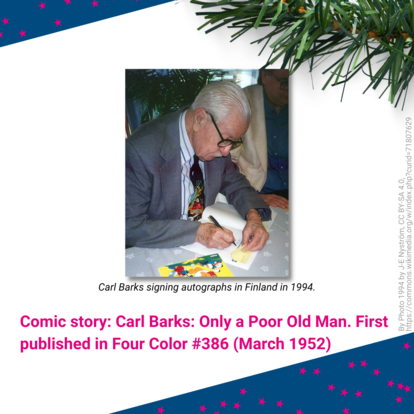Countdown to Christmas
18 - Thriftiness

- Benjamin Franklin's 1732 saying "a penny sav'd is a penny got" certainly does not fully explain how the capitalization of companies, that has made prosperity for all possible, has come about since the Industrial Revolution. This required, among other things, solid capital markets and a functioning credit system. Still, the virtue of thriftiness, admired so by Franklin, plays an important role in every economic success story.
- Thriftiness is an important entrepreneurial virtue because it focuses on self-discipline, goal-directedness and a sense of responsibility in the use of scarce resources. In a free economy, these are not only prerequisites for one's own entrepreneurial success, but also for the release of forces that promote general prosperity in a market economy. But thriftiness as such is one of the secondary virtues that help capitalism generate its valuable human capital.
- While in a competitive and market economy every entrepreneur has an incentive to be thrifty, in politics the opposite is often the case. Since politicians sometimes believe that they have the power to take on almost unlimited amounts of debt in order to distribute election gifts to increase their re-election chances, thriftiness is less common in the world of the state than in the world of free enterprise. However, in the long run this can lead to state bankruptcy, the impoverishment of a society, and sometimes even in riot or civil war.
- Adam Smith in 1776 rightly observed about the dangers of wastefulness in government: "What is prudence in the conduct of every private family can scarce be folly in that of a great Kingdom."

Carl Barks was the greatest storyteller and illustrator among the comic artists employed by Walt Disney. In his wonderful story “Only a Poor Old Man”, Scrooge McDuck's personality is fully developed for the first time. The uncle of the better-known Donald Duck is a major entrepreneur and the richest duck in the world. He likes to bathe in his thalers in his money bin. He is considered a little hard-hearted and thrifty to the point of real avarice.
When he learns that his arch-enemies, the Beagle Boys, want to break into his money bin, with the help of Donald and his great-nephews Huey, Louie, and Dewey he hides his money underwater in a reservoir he bought. The Beagle Boys find the hideout and buy the property below the lake, and then try to destroy the dam. A fight for money and the reservoir begins that is both very funny and exciting, too. The end of the story is not revealed here.
As the story progresses, it becomes apparent that behind Scrooge's rugged facade and thriftiness there are many admirable entrepreneurial virtues. He is a self-made pimpillionaire (which is much, much more than a mere billionaire) and has earned his money through the hard work with his own hands with a lot of personal sacrifice. He dug for gold in Alaska and dived for pearls in the Pacific with the help of trained cormorants (his knowledge of the cormorant language helps him in the fight against the Beagle Boys). He is also so thrifty because each of the countless pieces of money is associated with a memory of the arduous acquisition. He personally knows every coin and every banknote in his money bin.
In the end, he still doesn't appear to be a particularly warm-hearted duck, but as an exemplary, honest and respectable entrepreneur who made his fortune through his own initiative and not through government subsidies at the expense of others. Everything is well earned and his thriftiness is part of his motto as an entrepreneur, which says he is "tougher than the toughies and smarter than the smarties!"
